The International Commerce Terms (Incoterms) are defined by the International Chamber of Commerce (ICC), there are 11 of them and each one has its characteristics and particularities, while they are divided using transport. They regulate:
- At what time and place the transfer of risks on the goods occurs, from the seller to the buyer.
- The place of delivery of the goods.
- Who contracts and pays transportation and insurance costs.
- What documentation each party has to process.
Incoterms are rules formed by a set of three-letter terms that regulate the responsibilities of companies in contracts of sale of goods, accepted by governments, businessmen and professionals around the world for the interpretation of the most common terms used in international trade.
What are these Incoterms?
EXW, FCA, FAS, FOB, CFR, CIF, CPT, CIP, DPU, DAP, DDP
What does each term mean?
EXW: Ex Works (in factory)
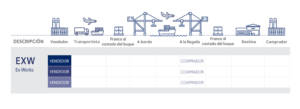
- The seller/exporter delivers the goods to the buyer at his own (the seller’s) warehouses, so he only has to take care of packing the goods.
- The buyer/importer is responsible for all costs and bears all risks as soon as he picks up the goods at the seller’s warehouse. Once it leaves the warehouse, before loading, the buyer has full responsibility for the cargo. Insurance is not compulsory, but if it is taken out, it is the responsibility of the buyer, who assumes the risk.
Therefore, the Incoterm EXW should only be used when the seller delivers the goods at his premises, if it is done at any other place another term should be used.
FCA: Free Carrier
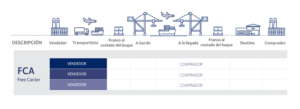
- The seller delivers the goods to the buyer at a pre-agreed point and bears the costs and risks until the goods are delivered at that point, including the costs of customs clearance for export. Therefore, the seller is responsible for inland transport and customs export formalities, unless the agreed site is the seller’s facilities (FCA warehouse), so the goods are delivered at that point once loaded on the means of transport arranged by the buyer, who is the one who will bear the cost of the load.
- The buyer, as we have mentioned, is the one who assumes the costs from loading on board to unloading, including insurance in the case of contracting it, since he is the person who bears the risk when loading the goods on the first means of transport.
FAS: Free Alongside Ship

The seller, as the name suggests, delivers the goods to the loading dock at the port of origin next to the vessel where the goods will be transported. The seller bears all costs up to delivery, including export customs clearance.
The buyer is responsible for the cargo while on board the vessel, in addition to its storage, freight and other expenses until it is delivered at its destination, including import clearance and insurance (if it has been contracted by agreement between the parties since it is not mandatory). Likewise, it assumes the risks at the time the goods are at the loading dock before being loaded onto the vessel.
This Incoterm is only used for maritime transport, normally for special products due to their cargo requirements. It is not very common in palletized or containerized cargo.
FOB: Free On Board

The seller bears all costs and risks until the goods are loaded on board the means of transport, as well as the export clearance and costs at the origin. In addition, it is also responsible for arranging transportation if it is at the buyer’s expense.
The buyer is responsible for the costs of freight, unloading, import formalities, delivery at destination and insurance if any. Risks are transferred at the time the goods are on board.
The FOB Incoterm is only used for maritime transport. and should not be used for goods in containers since liability is transferred when the goods are loaded on board the vessel, i.e. when the goods physically touch the floor of the vessel, but in the case of containers they are not loaded as soon as they arrive at the terminal, so if the goods suffer any damage while in the container it would be very complicated to establish when it occurred.
CFR: Cost, Insurance and Freight

The seller is responsible for all costs until the goods arrive at the port of destination, including export clearance, origin charges, freight and usually unloading charges.
The buyer is responsible for import formalities and inland transportation to the destination. It assumes the risks as soon as the goods are on board, so it is common to take out insurance, although it is not mandatory. It also assumes the cost of importing the inland transportation to the destination.
It is only used in maritime transport.
CIF: Cost, Insurance and Freight
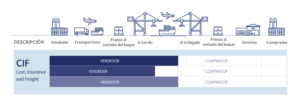
The seller bears all costs until the goods arrive at the port of destination as well as the CFR (import clearance, origin charges, freight and usually unloading costs). In addition, CIF requires insurance at origin, even though the risk is transferred to the buyer at the time the goods are on board the vessel. Likewise, the buyer assumes the cost of importing and inland transportation to the destination.
On the other hand, it is only used in maritime transport. It is one of the most widely used since it determines the customs value.
CPT: Carriage Paid To
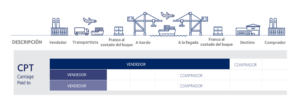
In the CPT the seller bears all costs until the goods are placed at the disposal of the seller at the place agreed upon by both parties, which involves costs of origin, export clearance, payment of the main transport and, normally, the costs of destination (e.g. inland transport).
The buyer is responsible for the import formalities and insurance in case it is contracted. As for the risk, it passes to the buyer when the goods are loaded on the first means of transport contracted by the seller.
The CPT Incoterm applies to all modes of transport
CIP: Carriage and Insurance Paid
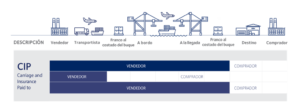
The seller bears the costs until the goods are delivered to the agreed destination, i.e. the costs of origin, export clearance, sea freight and insurance, which in this case is compulsory.
The buyer, on the other hand, has to take care of the import formalities and delivery at the destination. The risk is transferred when the goods are loaded on the first means of transport.
DPU: Delivered at place Unloaded

The seller must pay the costs and risks of all the origin formalities, i.e. packing, loading, export clearance, freight, unloading at destination and delivery at the point previously agreed between the parties.
The buyer is responsible for all import clearance formalities.
DAP: Delivered At Place
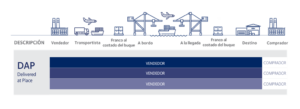
The seller bears all risks and expenses of the deal except import clearance and unloading charges at the destination. Therefore, the seller assumes the costs of origin, freight and inland transportation. If insurance is taken out (it is not mandatory), the seller will bear the costs.
The buyer, therefore, bears only the import clearance and unloading costs.
It can be used with all means of transport.
DDP: Delivered Duty Paid
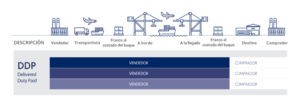
The seller shall pay all costs and risks that occur from the packing of the goods and their corresponding verification in the warehouse until the goods reach their final destination, including import and export clearance, freight and insurance in case it is contracted.
The buyer is only responsible for receiving the goods and normally for unloading them, although it is not obligatory for him to do so, the seller may also do so (according to the agreement).
As you can see, this Incoterm is the opposite of EXW, since the seller is the one who assumes all the risks and expenses.
To summarize:
Incoterms for any means of transport
EXW (Ex Works):the buyer has to pick up the goods directly at the seller’s premises (usually a warehouse or factory). From there, the buyer bears the costs and risks.
FCA (Free Carrier):the seller delivers the goods at a point agreed with the buyer, always within the country of origin. The seller will be responsible for all the formalities and associated costs up to the collection.
CPT (Carriage Paid To):the seller bears the cost of shipping to the destination country or other agreed place. But once the goods are in the hands of the carrier, the risk passes to the buyer.
CIP (Carriage And Insurance Paid):similar to CPT, but the seller also pays the insurance.
DAP (Delivered at Place):both parties agree on a delivery point and the seller bears all costs and risks until the buyer picks up the cargo. Import charges are not included and are paid by the buyer.
DPU (Delivered at Place Unloaded): delivery, including unloading, is made at the place chosen by the buyer. It only has to pay the import clearance. All other costs are the responsibility of the seller.
DDP (Delivered Duty Paid): is the most convenient method for the buyer, since the seller takes care of everything: transport, unloading, insurance, import…
Incoterms for maritime and inland waterway transportation
FAS (Free Alongside Ship): normally used for very bulky or bulk cargoes. The seller leaves the goods at the chosen port, next to the ship that will transport them.
FOB (Free on Board): this is one of the most commonly used rules for maritime transport. The seller transfers the goods on board the vessel, not just leaves them on the quay. Does not apply to river transportation.
CFR (Cost and Freight): the seller pays all transportation costs, from the time the goods are loaded on the vessel until they arrive ashore at the port of destination. However, the buyer is responsible for any damage from the time of shipment.
CIF (Cost Insurance and Freight): as with the CFR, the seller covers all transportation costs, but where the insurance is also included.
Do you have doubts about which Incoterm to use on each occasion?
Do not hesitate to contact us!
The images used in this post are property of DSV.
Subscribe to our newsletter.
We will keep you informed of all the latest news



